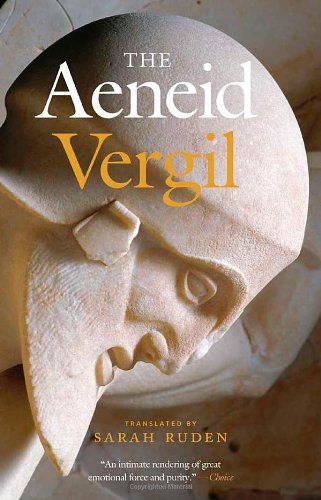What a ride. I am so grateful to have stumbled upon:
- Hooked on Houses, which highlighted
- This house, home to Edie Wadworth, blogger at
- Life in Grace, where I saw
- This post about her on-line book club, where they were going over Plato's Republic.
I am a better person for having read this book. I just finished it and I'm feeling a little thunderstruck at the ending, as if a movie just cut to black at the climactic scene. I hope I can be organized enough to put my thoughts on paper (or computer, as it were).
First, let me praise Sarah Ruden's translation. The language sings. Some of the lines just beg to be read, re-read aloud, committed to memory. One of the most memorable passages to me is when old King Evander sends his only and greatly beloved son Pallas into battle:
"You, gods above, and your great governorBeautiful, human, powerful. Brave men facing the unknown.
Jupiter, pity an Arcadian king,
And hear a father's prayer. If your divine power
And fate will keep my Pallas safe for me,
And if I live to see him face to face,
I beg to live, no matter what I suffer.
But if you threaten, Fortune, what I can't say,
Let me break off my wretched life already,
While fears are unconfirmed, hope arguable,
While you, dear son, sole pleasure of my old age,
Are in my arms, and no hard news is wounding
My ears." The father, at the last farewell,
Poured out these words, and swooned.
Second, the characters, even those sketched so briefly, are vivid. Many appear for just a page or two, but Vergil's precise storytelling renders so many as real people. ("Is it gods who make me want this, or do we make our deadly urges gods?") Frankly, my limited reading of the classics, including this one, points me to the fact that human nature is unchanged. We all long for heroes, to be heroic, and we all have flaws. Seeing those characteristics in these larger-than-life characters makes you look at everyone around you with different eyes.
Third, the scope is vast and sweeping, both geographically and emotionally. This book has it all-- a desperate flight from defeated Troy, wild ocean adventures, romance (and jilted lovers), intense battles--all while suffering the meddling of the gods.
I don't want to do a more careful analysis, because I just want to savor the story and the effect it's had on me for a while. Apparently I've raved enough about it that Matthew took it out of my hands the moment I finished it.
I do want to highlight one thing I've discovered about reading "hard" books: don't read the introduction, author's notes, or any lectures before you read the work itself. Meet the story on its own terms. Time and again I had my enjoyment of a book derailed by reading about the book before I read the book, and I came to it with preconceived ideas. You can read these books. I can read these books. Just jump in.

1 comment:
Thanks for the encouragement, Cheryl. That is great advice at the end. :-)
I love the example you are setting for you kids by reading "hard" books!
Post a Comment